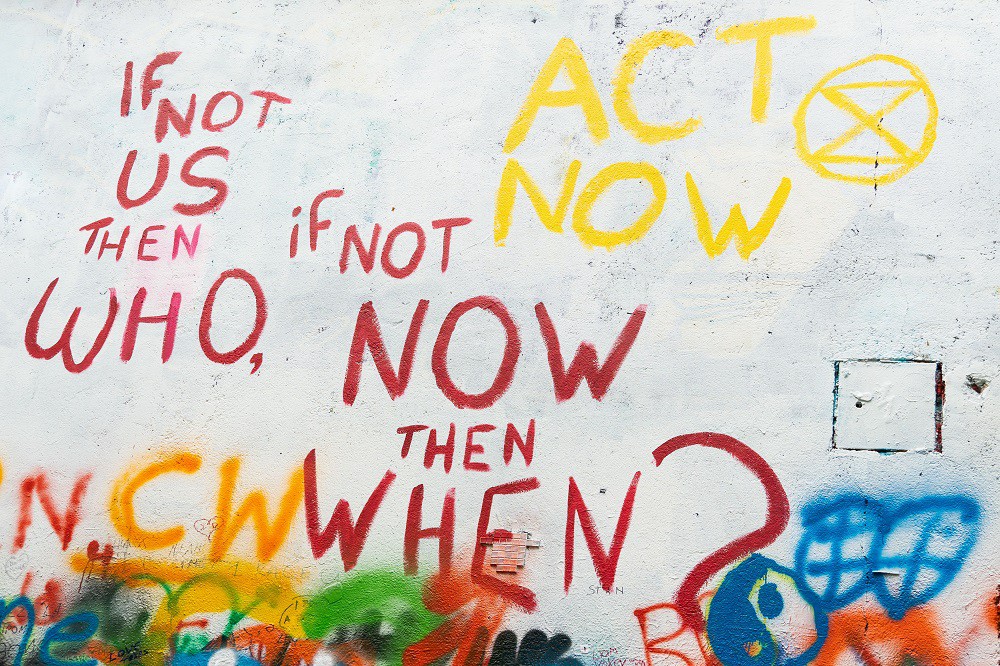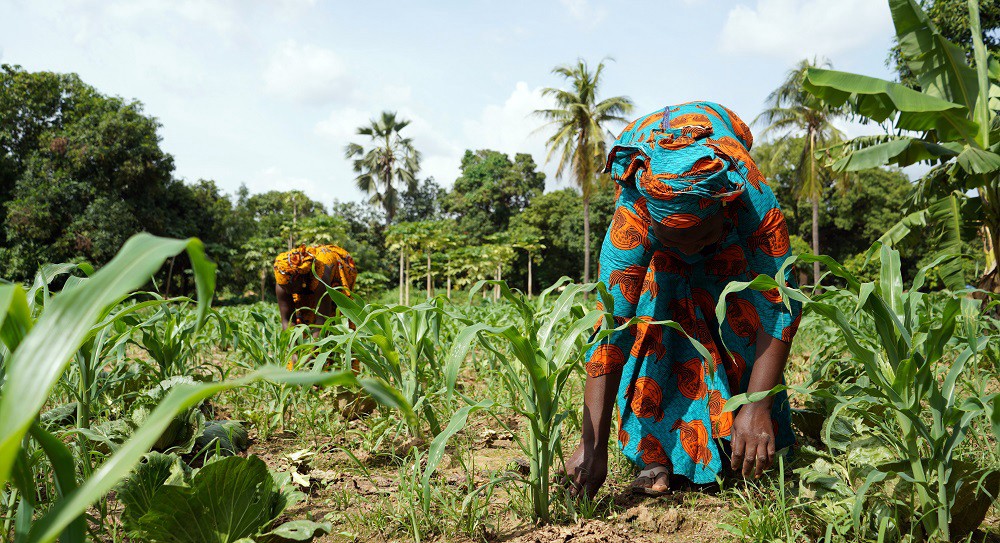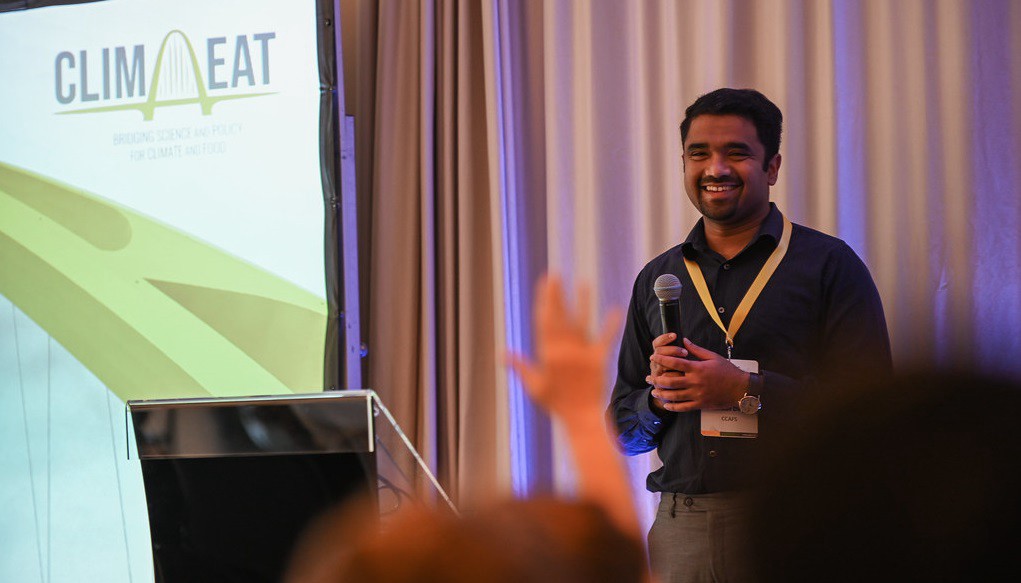After COP26: putting ideas into action on climate change

Research is at the heart of understanding and combatting climate change. But is this knowledge reaching those in government and elsewhere who need to act?
Dr Dhanush Dinesh thinks not. This is why he set up Clim-Eat, an organisation that aims to connect science and policy around climate change and food.
Clim-Eat calls itself a ‘think and do’ tank, as it aims to do much more than just publish reports. It actively engages with policy makers and helps build capacity within organisations, so that policy can be turned into action.
Dr Dinesh has been working in climate change for 12 years, including as Global Policy Engagement Manager for the Climate Change, Agriculture and Food System (CCAFS) research programme, based at the University of Leeds. It was there he met the University’s leading academics in climate change, food systems and agriculture.
That role, as others before it, highlighted to him how hard the academics had to work to make policy makers sit up and take notice.
“I saw that universities alone couldn’t be expected to fill the gap that still exists between science and policy,” says Dr Dinesh. “I decided to create an organisation that would help them to do that and Clim-Eat was born.”
Contacting researchers and policymakers is crucial to developing sustainable farming policies.

Contacting researchers and policymakers is crucial to developing sustainable farming policies
Pushing the COP agenda
Clim-Eat was established thanks to funding from the Dutch government and is hosted by the Netherlands Food Partnership.
The Clim-Eat team is a combination of committed young advocates who focus on policy advice, partnerships, knowledge brokering, events, capacity building and internationally renowned scientists who provide thought leadership and translate and synthesize evidence. It also includes a University of Leeds Innovation Fellow, Dr Nicole Nisbett.
The team is already having an impact, working with the UK government to take forward the COP26 Agriculture Breakthrough agenda, which aims to make climate-smart, sustainable agriculture the most attractive and widely adopted option for farmers everywhere by 2030. They are helping identify the people and organisations that need to be involved and helping to bring more countries on board.
In June 2022, Clim-Eat ran a joint event with the University of Leeds, representatives from UK, Kenya, CGIAR and the Southern African Confederation of Agricultural Unions at the UN intersessional climate conference in Bonn, Germany.
The event discussed ways to make the Agriculture Breakthrough agenda work for Africa. Watch a recording of the UN intersessional climate conference event on YouTube.
The team are also advising the Egyptian government on preparations for COP27.
The COP 26 Agriculture Breakthrough agenda seeks to make climate-smart farming a reality around the world.

The COP 26 Agriculture Breakthrough agenda seeks to make climate-smart farming a reality around the world.
The passion behind the project
The idea behind Clim-Eat and its rapidly growing momentum can be traced back to Dr Dinesh’s own background in environmental activism.
His early goal was to become an entrepreneur, but during his Master’s in Business Administration in his native India, Dr Dinesh realised his real ambition was to have a positive impact on society, in particular on climate change.
He did a Master’s in Carbon Management in Edinburgh, and then worked for small consultancies and major UN agencies, including the Food and Agriculture Organisation. There, he advised organisations and countries on how to lower their emissions, manage their ecosystems and deal with land use issues.
His motivation was always to find a platform to have the greatest impact, and in his PhD research at the University of Utrecht, he studied approaches to improve science-policy engagement.
Influencing policy through research
Dr Dinesh’s extensive experience working for various private and not-for-profit organisations in the UK, China and Thailand and his work at the CCAFS agricultural research programme have been crucial to setting up Clim-Eat. At CCAFS, a programme partly hosted by the University of Leeds, he helped make sure the research influenced global food and climate policy and managed global partnerships, for example with the World Bank.
Dr Dinesh is now a visiting researcher at the University and part of the COP taskforce. He helped the University’s preparations for the landmark COP26 climate conference in Glasgow in 2021 and, in the lead up to COP27 in Egypt, Clim-Eat is working closely with the Presidency (the hosting government) to support the design and development of flagship initiatives on agriculture (Food and Agriculture for Sustainable Transformation) and water (Action for Water Adaptation and Resilience).
The team is providing scientific inputs in the design of these initiatives and helping convene partners such as researchers and industry partners to translate these initiatives into climate action.
Dr Dinesh says: “We find that a key strength we have is our networks. People know us and trust us, so when we invite them to join such initiatives, they are easier to get on board.”

Photo by Neil Palmer. Dr Dinesh at the Climate Change, Agriculture and Food System (CCAFS) Science Meeting 2021, in Spain.
By building relationships and trust between researchers, policymakers and industry partners, Clim-Eat aims to bridge a gap; helping policymakers and industry connect with research, but also helping academics to reflect real-world challenges in their research.
He adds: “When you try to inform policy makers, it is important to understand their needs, priorities, challenges and then respond to those.”
Impact is key
While the first few months of Clim-Eat have gone even better than he hoped, Dr Dinesh has already decided that he will only continue with the ‘think and do tank’ if it has the impact he wants.
“Organisations are usually set up to achieve a specific aim, but explains Dr Dinesh if you’re successful, then your organisation shouldn’t be needed any more and it’s time to either evolve or move on to another endeavour,” says Dr Dinesh
“My vision is for Clim-Eat to help new ideas come into play in the food system, to help reduce emissions from agricultural activities and increase the resilience of farmers. So long as we’re on a path to achieve that, we’ll keep going.”
This article was originally featured on the University of Leeds Medium site
